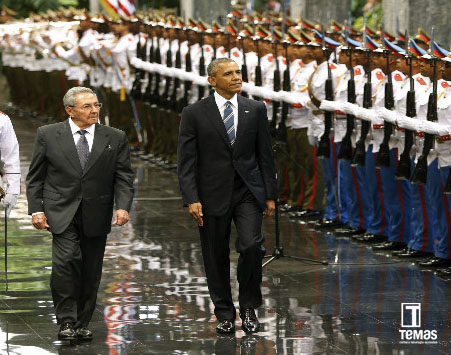Este trabajo pertenece al dossier Cinco años de la visita de Barack Obama a Cuba.
Dentro de pocas semanas se cumplen cinco años de la visita del presidente Barack Obama a Cuba. Como ocurre con muchos acontecimientos, las imágenes circulantes en los medios desde el mismo instante de la visita, así como los mecanismos recónditos de la memoria, han contribuido a mitificarlos con un signo u otro. En aquella circunstancia, Temas invitó a un grupo de estudiosos de las relaciones interamericanas, oriundos de los Estados Unidos, América Latina y el Caribe, y en particular de Cuba, a reflexionar sobre su connotación. Rescatamos aquellas miradas por su utilidad para pensar de manera crítica y ecuánime algunos problemas del presente y los escenarios por venir.
*Publicado el 21 de marzo de 2016
In the next few days, President Barack Obama will visit Cuba, the first sitting president to do so in nearly 90 years. The trip has enormous symbolic importance for the president, as it provides public show and recognition of the major rapprochement with Cuba that was announced in November 2014. But, what will the two countries gain from the visit, if anything.
The president’s dramatic and controversial shift on U.S. policy toward Cuba has three principal determinants. First, and foremost, is the fact that the so-called embargo on Cuba has been a failure. Second, the embargo and U.S. insistence that Cuba be excluded from the hemispheric community had become the single most important source of hostility toward the U.S. throughout Latin America. Finally, engagement with all countries is a major facet of Obama’s foreign policy. He is convinced that the U.S. can bring hostile or authoritarian regimes closer through engagement than through hostility or invention.
The first factor sometimes gets lost in the noise made in Washington by the very small but powerful cabal of Cuban-American legislators, of both parties. All of these have raised their voices to denounce the change in policy and, again, to criticize the president’s visit. But, the debate in the congress is shifting. Just last year, in the House, a bipartisan Cuba Working Group was created to allow wider discussion of expanding trade and investments in an attempt to make it clear that the old Cuban-American group no longer represents the broader interests of the United States.
The second factor propelling the change in U.S. policy – U.S. relations with the rest of the hemisphere – probably has provided the largest immediate dividend. Attitudes toward the U.S. have mellowed in the last year. Strident anti-U.S. statements have all but disappeared, except from a tiny (and shrinking) group, led by Venezuela. It may be coincidence, but it is an important change that in the last year governments in Venezuela, Argentina, and Bolivia that had declared their hostility to the U.S. were dealt severe defeats at the polls
It is no accident that Obama will continue his trip from Cuba to Argentina, where he will meet with the new president, Mauricio Macri. What Obama wants is to strengthen the hemispheric community that favors the rule of law. The stronger the rules that bind the members of the community, from Mr. Obama’s perspective, the better protected will be U.S. interests. This is not a left – right power struggle. The group of nations that is taking the lead in the construction of this community includes Brazil, Chile, Costa Rica, and Uruguay, all social democracies; and Argentina, Colombia and Peru, all governed by center-right parties. The growing pressure is now turned against authoritarian or semi-authoritarian regimes, and that is what Mr. Obama wants to reinforce during his trip to Latin America.
The timing of Obama’s visit is designed to maximize the significance of what he can accomplish as president without congressional cooperation. This week he announced further steps to ease travel to the island to reduce bureaucratic obstacles to business activities between the two countries. The timing also maximizes the impact the administration might have on the ongoing election campaign. That is why he is going to Cuba now and not after the election in November. His actions demonstrate how impotent the Cuban-American lobby has become and damages the credibility of both Ted Cruz and Marco Rubio.
Further, making the trip now instead of after the elections lends powerful support to the growing bloc of economic interests for which increasing trade and investment is important. It also lends support to the bipartisan effort in the congress by indicating that an alternative to the embargo is politically viable. The lack of criticism of the administration’s policy shift on Cuba is a powerful demonstration of how eroded support for the old hardline Cuban-American cabal has become, even among the exile community in South Florida. The rapprochement with Cuba will help the Democratic nominee in the election campaign. Even Donald Trump, who is leading in the Republican primaries, has indicated his support for Obama’s move to normalize relations.
Aside from the symbolism of the visit – there will be a baseball game as well – no one should expect any major announcements of progress in the process of normalization. On the U.S. side, the president can only do so much without congressional abrogation of the legislation that constitutes the embargo. He will continue to reduce or limit the restrictions on tourism and trade and investment; but, in the short time remaining in his tenure, he cannot do much.


Deje un comentario